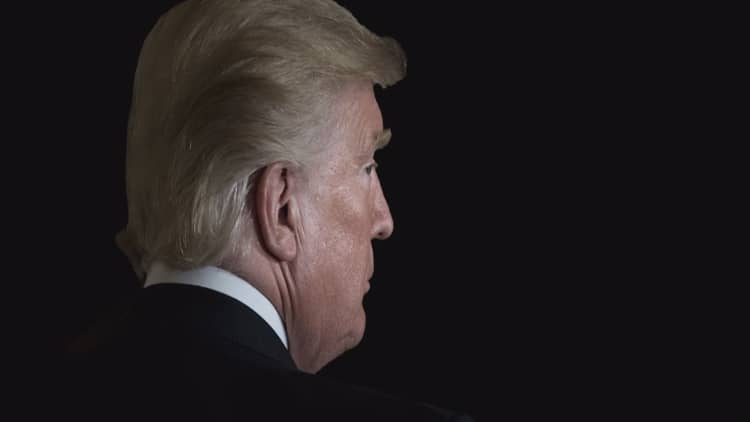The White House on Monday dropped its effort to revoke CNN correspondent Jim Acosta's press credential, while implementing new restrictions on journalists covering President Donald Trump and other White House officials.
"This afternoon we have notified Jim Acosta and CNN that his hard pass has been restored," White House press secretary Sarah Huckabee Sanders said in a statement to reporters. "We have also notified him of certain rules that will govern White House press conferences going forward."
Failing to abide by the new rules could lead to reporters losing their press passes, according to Sanders' statement. "We have created these rules with a degree of regret," she said.
CNN, in a tweet from the network's communications team, announced Monday that it would drop its lawsuit against Trump, Sanders, chief of staff John Kelly and other Trump administration officials.
Monday's development marked the latest dramatic twist in a fight that erupted earlier this month between President Donald Trump's administration and Acosta's employers.
On Friday, U.S. District Court Judge Timothy Kelly ruled in favor CNN's request for a temporary restraining order that rescinded the White House's decision to yank Acosta's hard pass, which gave him access to the White House grounds. The order lasts for 14 days, multiple outlets reported.
Hours after that ruling, Sanders and communications chief Bill Shine sent Acosta a letter saying the Trump administration had come to a "preliminary decision" to once again revoke his press pass once the temporary court order expires. They gave Acosta the option to "contest" that initial decision, however, before they came to a "final determination."
In a response Sunday, a lawyer for CNN rejected what it called the White House's "attempt to provide retroactive due process," and warned that it will seek to depose the defendants, who include Trump, "on their intentions and their conduct" unless the administration halts its action against Acosta.
Shine and Sanders had cited Acosta's "conduct" at a presidential news conference a week earlier on Nov. 7. "The President is aware of this preliminary decision and concurs," Shine and Sanders wrote.
At that presser, where Trump declared victory after the midterm elections, Acosta had disputed the president's use of the word "invasion" to describe a caravan of Central American migrants traveling to the U.S.-Mexico border. The exchange grew more heated as Acosta continued to ask follow-up questions, prompting a White House intern to try and grab the microphone from the reporter, who initially refused to let go of it.
Later that day, Acosta announced that he had been barred from the White House grounds by the Secret Service.
In the lawsuit, CNN had argued that Acosta's rights under the First and Fifth amendments to the Constitution had been violated. The White House countered that it had "broad discretion" to remove Acosta's pass, and highlighted his "decision to engage in conduct that disrupts press events and impedes other reporters from asking questions" in its argument.
At the Friday hearing, Kelly granted CNN's request for a temporary restraining order, ruling that the White House had indeed violated Acosta's due process rights.
The new rules press conference rules are as follows:
1. A journalist called upon to ask a question will ask a single question and then will yield the floor to other journalists;
2. At the discretion of the President or other White House official taking questions, a follow-up question or questions may be permitted; and where a follow up has been allowed and asked, the questioner will then yield the floor;
3. "Yielding the floor" includes, when applicable, physically surrendering the microphone to White House staff for use by the next questioner;
4. Failure to abide by any of rules 1-3 may result in suspension or revocation of the journalist's hard pass.
Sanders had teased the new requirements after Judge Kelly's ruling Friday. "There must be decorum at the White House," she said at the time.
In their letter to Acosta sent Friday evening, Sanders and Shine said, "We had not previously thought that a set of formal rules for journalists' behavior at press conferences was necessary." They listed "basic, commonsense practices" for journalists to follow, such as asking a single question and then yielding the floor unless a follow-up is permitted by the president or other White House staff.
They wrote that their preliminary decision would become "final" unless Acosta responded by 5 p.m. Sunday to contest the action, in which case they would issue a "final determination" by Monday at 3 p.m.
A lawyer for CNN responded in an email to Justice Department lawyers Sunday, "To say the least, the letter is a disappointing response to the court's decision and our attempts to resolve the matter amicably." CNN's response added that "unless you can confirm to our satisfaction that no action will be taken against Mr. Acosta, we will seek expedited discovery, including depositions, from all defendants on their intentions and their conduct."
In an attached letter, CNN's lawyer rejected that there are tacit rules of conduct for White House reporters, and noted that other journalists at the Nov. 7 event had asked follow-up questions to Trump "without consequence."
Trump, in an interview with Fox News' Chris Wallace that aired in part on Friday, said of the ruling that "It's not a big deal and if he misbehaves, we'll throw him out or we'll stop the news conference."
WATCH: Trump's fight against 'fake news' has been a boon for media companies



